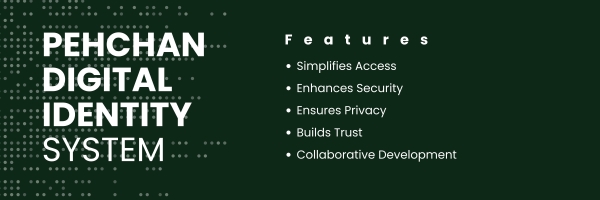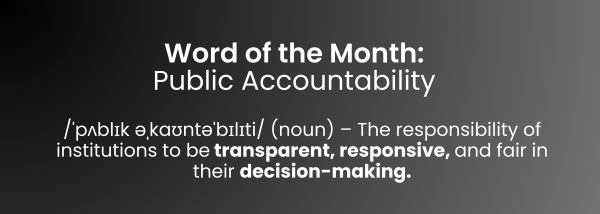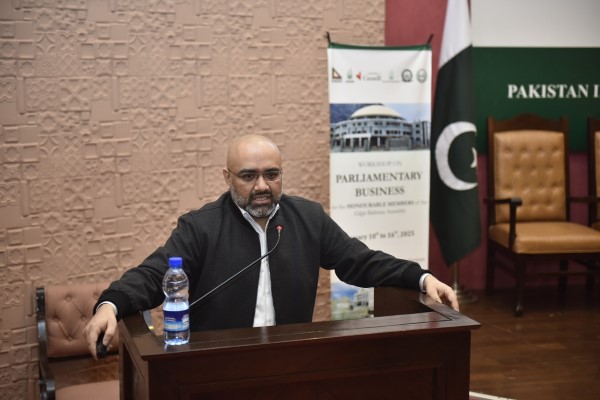A Story You Are Part Of
Good governance isn’t measured by policies alone — it’s defined by how well institutions serve the public. When systems are slow or opaque, trust fades. But when processes are transparent, efficient, and accessible, people don’t just comply. They participate.
This month, we’re focusing on governance in practice through digital tools, transparency, and community-driven approaches. From modernizing water billing to re-framing digital identity, these projects are shaping how governance works in Pakistan.
E-Abiana: A Governance Shift in KP’s Agriculture Sector
For farmers in Khyber Pakhtunkhwa (KP), water billing has long relied on handwritten records, manual transactions, and little transparency. The E-Abiana system developed in collaboration with the Irrigation Department KP is introducing digital water bills— making payments more trackable, reducing dependency on cash handling, and cutting down the administrative burden on government staff.
But that’s not the whole story.
The E-Abiana digital system will also save countless government hours by reducing the need for multiple visits by patwaris (village accountants) to measure land, record data, and collect payments. Instead of managing stacks of handwritten bills and manually handling cash, field officers will enter measurements digitally, and farmers will receive computer invoices — similar to an electricity bill.
What This Means for Governance
- Less reliance on manual billing — Farmers receive direct invoices instead of handwritten bills
- More transparency in transactions — Payments go through banks or mobile wallets, reducing cash dependency
- Scalable approach — The KP Fellowship’s model proves that digital governance can be implemented efficiently, even with limited resources.
Built by Fellows, Designed for the Future:
"A pivotal moment for me was working on a project to simplify government forms for rural communities. Seeing how a simple design adjustment reduced confusion and improved accessibility was eye-opening and rewarding. This reinforced my belief in the power of thoughtful design. With the E-Abiana System, I’m motivated to create interfaces that empower farmers, helping them manage billing and payments with ease."
Mahnoor, Fellow from the 8th Cycle of Fellowship
🔗 Meet the Fellows behind E-Abiana
Rethinking Governance in Gilgit-Baltistan
In Gilgit-Baltistan, effective resource management demands tools tailored to the region’s unique geography and infrastructure. During our recent session with the GB Assembly, in collaboration with the Pakistan Institute for Parliamentary Services (PIPS), we examined how successful digital governance models from countries like Estonia and India can be adapted to local needs.
Key Takeaways for Smarter Governance:
- Learning from Global Models – How other governments structure digital services
- Localized Approaches – Custom tools for tracking and managing resources
- Digital Trust – Strengthening public confidence through transparent processes
Why This Matters for Governance
- Digital systems streamline record-keeping and decision-making
- Real-time data improves planning and policy implementation
- Public engagement with digital tools bridges the gap between citizens and institutions
A big thank you to the GB Assembly Members for working toward governance that adapts to local realities.
 Pehchan: A Digital Identity, Built for Public Trust
Pehchan: A Digital Identity, Built for Public Trust
Logging into government services shouldn’t feel like cracking a secret code. Yet across Pakistan, citizens juggle multiple credentials, locked-out accounts, and endless paperwork — just to access their rights.
With Pehchan, we’re making access simpler and more secure. It’s a digital identity system designed to work seamlessly across services, ensuring convenience, privacy, and trust.
Pehchan isn’t just another tech rollout.
It’s being developed collaboratively — with input from technologists, governance experts, and our community — to ensure it meets the highest standards of security and accessibility.
We’re building Pehchan in the open, and we’re looking for experts and contributors to help shape its foundation.
Join the Community Group
Digital Governance Specialists – Support Pehchan’s integration with public services
Cybersecurity Experts – Ensure Pehchan remains secure and resilient
Developers & Cryptographers – Build authentication systems that prioritize user privacy
Technical Writers & Advocates – Help make Pehchan accessible for all
This is your opportunity to contribute to Pakistan’s digital future in a way that benefits both citizens and institutions.
Be part of the team shaping the future of Pakistan's new digital identity!
🔗 Read Redefining Pakistan's Digital Identity
A Final Thought: Governance in the Digital Age
Governance isn’t just about policy—it’s about how systems function in practice. Digital tools can enhance transparency, efficiency, and accessibility, but only when built on trust and accountability.
- An accurate water bill means clear, accountable record-keeping.
- A village accountant using real-time data reduces administrative burden.
- A community-led digital identity system ensures secure, inclusive access to services.
Digital governance doesn’t replace institutions—it strengthens them through better processes, smarter data use, and open collaboration
Until next time,
Team Code for Pakistan
Building Better Governance, Together With You
#12yearsofTechForGood

